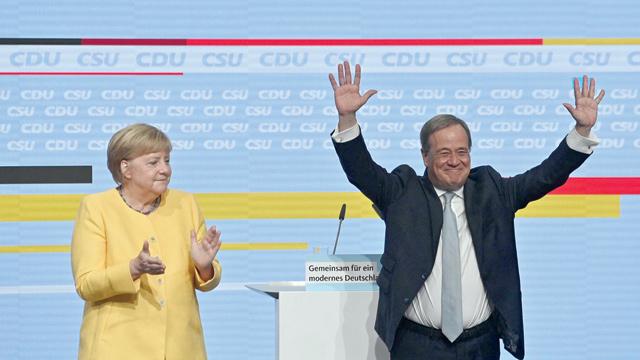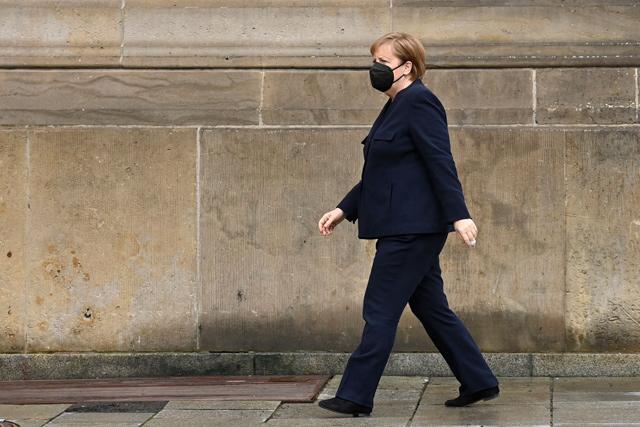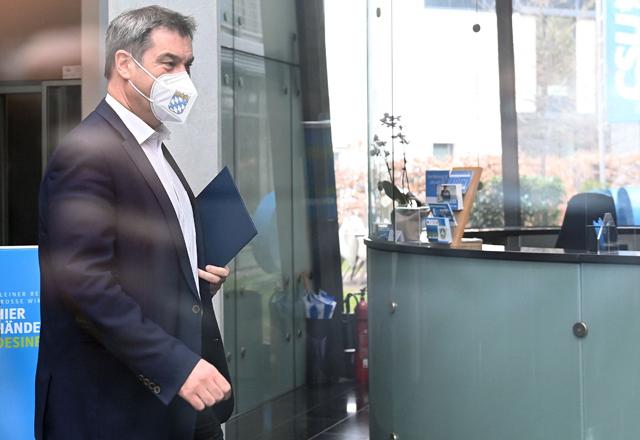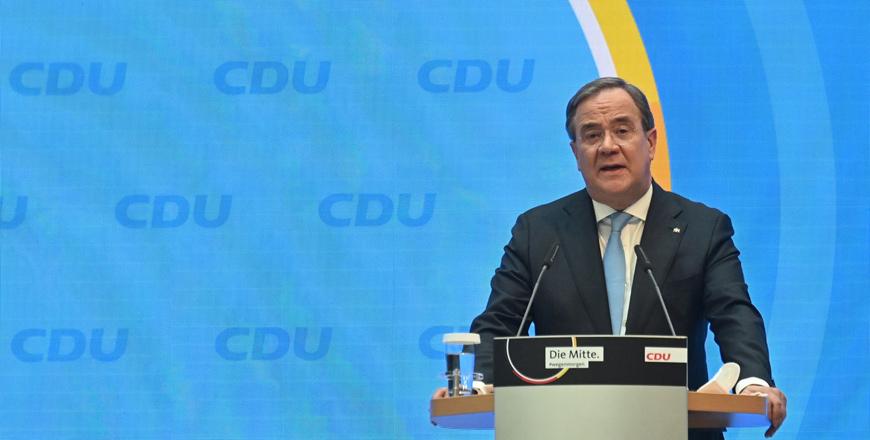You are here
As conservatives' fortunes plunge, Merkel rides to rescue
By AFP - Aug 21,2021 - Last updated at Aug 21,2021

German chancellor Angela Merkel and Armin Laschet, leader of Germany's conservative Christian Democratic Union (CDU) Party and candidate for chancellor in the upcoming general elections wave on stage at the end of a CDU/CSU campaign rally for the general election scheduled for September 26 at the Berliner Tempodrom on Saturday (AFP photo)
BERLIN — German Chancellor Angela Merkel on Saturday gave her would-be successor Armin Laschet a ringing endorsement, in a bid to shore up his ailing election campaign which has triggered fears their party could crash out of government.
Merkel's conservative CDU-CSU alliance has led Germany in four coalitions since 2005 when she took office, but the country's future new government has been thrown open as her departure from the political stage nears.
The 67-year-old veteran will step down after September 26 elections and has so far refrained from commenting about who she prefered to take over from her.
But at a key election campaign rally on Saturday, she voiced strong backing for Laschet.
“It has always been important to him to place the individual and their inviolable dignity at the centre of everything... I am deeply convinced that it is precisely with this attitude that [he] will serve the people of Germany as chancellor," she said at the rally.
While Merkel's popularity ratings have held steady in the twilight of her reign, Laschet has struggled to find favour with voters.
The latest polls show their conservative bloc now hanging on to a narrow lead of two per centage points against junior coalition partners the Social Democrats, who have in recent weeks made big strides to overtake erstwhile runners-up the Greens.
A survey published Friday showed just as many Germans want the Social Democrats (SPD) to lead the next government as the conservatives — an alarmingly big drop of five per centage points in backing for the CDU-CSU from early August.
The SPD's chancellor candidate Olaf Scholz was also more popular with voters — some 41 per cent of Germans prefer the centre-left politician as next chancellor as compared to just 16 per cent plumping for Laschet.
‘Quick and painful'
While frustration against the government over the coronavirus pandemic had initially weighed on the conservatives' popularity earlier in the year, the mood had brightened as more Germans were vaccinated and curbs were eased.
An initial boost in support for the Greens had also melted away as its leader was embroiled in a plagiarism scandal and other gaffes, giving the conservatives a strong lead in polls entering the summer.
But the mood dramatically turned in July when Laschet was seen chuckling in the background with local officials while Germany’s president gave a speech mourning victims of deadly floods.
Since the disaster, the conservatives have been unable to halt a falling trend in popularity.
The Taliban’s lightning takeover of Afghanistan also puts more pressure on Merkel’s government, which is under fire for failing to anticipate the crisis sooner.
At Saturday’s rally, Laschet acknowledged that the campaign was “going differently that the various strategies” drawn up by his party. But he blamed the pandemic and then the floods for derailing the plans, and did not address his failing popularity.
Criticism from several backbenchers had spilled out into the open on Friday, with the Bild daily even quoting MPs apparently urging Laschet to step aside for the sake of the party.
“A quick and painful reaction is better than to go down together,” CDU lawmaker Sylvia Pantel was quoted as saying by Bild.
The jitters in the conservative camp also risk reviving strife that had dogged the alliance of CDU and its sister party CSU even before the start of their election campaign.
Laschet only secured the conservatives’ chancellor candidate nomination in April after a bruising battle with the leader of Bavaria’s CSU, Markus Soeder.
Despite conceding after the loss, a whiff of discontent has lingered in the air from Soeder’s camp as the Bavarian has been consistently ahead in popularity polls against Laschet.
Soeder put up a united front with Laschet at the rally, telling him “Armin, you can rely on my support — this I mean in all honesty.”
But Soeder, who is also Bavaria’s state premier, also underlined that it was the conservatives’ toughest campaign since 1998, when the alliance was voted out of government.
“The trend is clear at the moment — it’s not heading steeply upwards,” he said, adding that “all’s not lost yet”.
“There’s no reason to complain, rather, it is time to really put up a fight. I have no desire to go into opposition.”
Related Articles
BERLIN — The two conservative leaders locked in an increasingly vicious battle for Angela Merkel’s crown struggled to reach a deal by their
BERLIN — The leader of Angela Merkel's party warned of a "polarising" election campaign on Monday as Germany's conservatives prepared for fr
BERLIN — Angela Merkel's conservatives on Tuesday confirmed Armin Laschet's disputed nomination as their chancellor candidate in September's


















